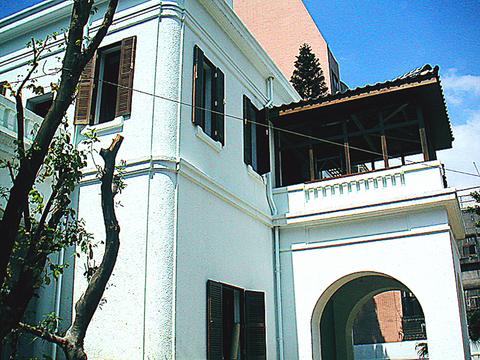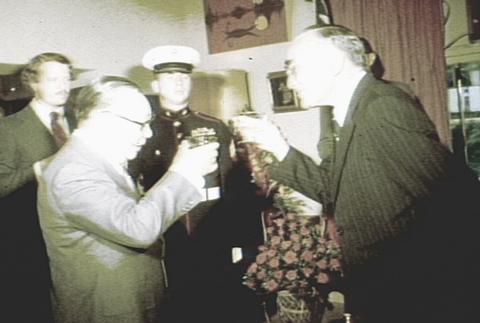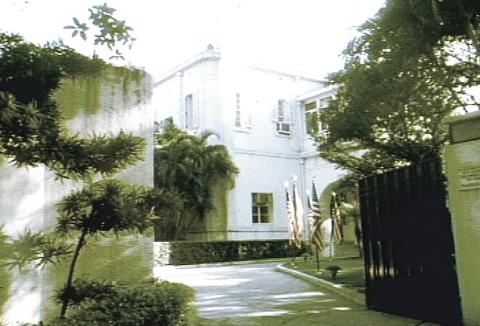Fifty years ago Chen Lien-heng (
"The ambassador's residence was so mysterious. I could never tell what was going on in there behind the walls," Chen said. "And, whenever the ambassador had important guests, the local police would come to my house and spy on his residence from my roof. The police would come around so often that it was as if they lived in my house," he said.
The years passed and there would be parties at the ambassador's mansion with elegant classical music in the house and qipao-clad women admiring the the art collection.

PHOTO COURTESY OF SPOT-TAIPEI FILM HOUSE
Aboriginal activist Hu De-fu (
The American ambassador's residence was built in 1901 by the Japanese. Throughout the century the nearly 2,000 square meter mansion was a focal point for celebrity, political and cultural life in Taipei. Originally an office building during the Japanese occupation, it later served as the American consulate building before the outbreak of World War II. After the war it was home for six American ambassadors. But the house has been empty since 1979, when the US broke diplomatic relations with Taiwan.
In 1997 the Taipei City Government, which was legally entitled to the rights to use the building, designated the former ambassador's residence as an official historical historic site and began to restore it, with the intention of turning it into an art salon. But the central government, which owned the property on which the mansion stood, wanted it to become a diplomatic museum instead. As a result of the disagreement between the two governments, nothing was done until current Taipei Mayor Ma Ying-jeou (

PHOTO: CTS
But for many who remember Taipei in the 1960s and 1970s, the American ambassador's residence will always symbolize the the American presence on Chungshan N Road.
In 1951, after the outbreak of the Korean War, the US established the headquarters of the Military Assistance and Advisory Group (MAAG) nearby the ambassador's residence. The MAAG's purpose was to block the expansion of communism in Taiwan and the rest of East Asia. A large US military compound was established on Chungshan N Road, Sec 3 and there was a grocery store, a parking lot and a military police facility for the Americans at what is now Chung Shan Soccer Stadium. On the other side of the road, at what is now the Taipei Fine Arts Museum, there was a base exchange, commissary and officer's club, as well as several guesthouses and hotels.
Dale Holmgren, an American businessman who joined the American Chamber of Commerce in 1962, came to Taipei as a lieutenant in 1958. He said that at that time a large part of the area around Chungshan N Road was covered with rice paddies. The main transportation was pedicabs and people in the area used to wear coolie hats.

PHOTO: CTS
Longtime residents might recall that in those days Taipei's pedicab drivers often ate lots of garlic to maintain their energy, he said. "But the smell was unforgettable."
Yeh Wen-shan (
"When an American soldier saw us, he would take a dollar bill from his pocket and show it to us. Then we would chase him to get the money," Yeh said. "At that time US$1 was worth NT$40, which was a lot of money in those days."
"Sometimes," Yeh added, "we would see American soldiers riding around on their motorcycles and we would get really excited. We would line up in a long line, waiting for the adoa to give each of us a ride around the ambassador's house," he said.
MAAG gradually expanded and by the end of the 1960s there were more than 2,000 American servicemen in Taiwan. The US presence increased further with the outbreak of the Vietnam War, when soldiers on tours of duty in Vietnam would come to Taiwan for R&R (Rest and Recreation). From 1965 to 1972, more than 200,000 American soldiers visited Taiwan in this fashion, and Chungshan N Road, naturally developed into a hub for their activities.
"Chungshan N Road was a little piece of America in Taipei," said Hu De-fu, who sang folk songs at clubs that the Americans frequented. "You could see soldiers on leave from Vietnam strolling down the streets with bar girls in tow. And the shops were full of foreign goods from the base exchange, such as alcohol, chocolate and tobacco. At night the smell of booze and marijuana, and the shouts of drunken soldiers filled the air. And you could hear prostitutes calling out to their prospective customers in pidgin English, `You come, I go.'"
Hu added that this decadent scene wasn't appreciated by the local people.
"Not true," said Chen Lien-heng, who has lived in the neighborhood for 50 years. "The Americans brought a lot of money with them and created a booming tourist economy in the area," he said.
Indeed, according to Chen and Yeh Wen-shan, soldiers and their girlfriends used to sell goods obtained from the base exchange to neighborhood shops, making Ching-kuang Market the largest purveyor of foreign goods in Taiwan.
Mary Hsieh (
"I have fond memories of those days. The GIs were so thin, but they really ate a lot! One of them could eat 20 eggs a day," Hsieh recalls. "Foreigners now don't seem much different to me, only they don't wear uniforms anymore."
"Revisiting the ambassador's house was just like remembering old times," Hu said. "We were really influenced by the Americans. I used to listen to Bob Dylan and Joan Baez on the Armed Forces Network and it was like an awakening for me."
For Dale Holmgren, who has been here for 44 years, the house also brings back fond memories of a forgotten era in Taiwan.
As for longtime resident Chen Lien-heng, "The walls have been torn down, so I feel like I've gained an extra courtyard in front of my house," he said. "And now, I can finally see what's going on inside of the house."
What: In anticipation of its grand opening on Nov. 10, SPOT-Taipei Film House will host six free screenings of recent films per day, starting today. The screenings are from 11am to 2am, until Nov. 9.
Where: 18, Chungshan N Rd, Sec. 2, Taipei<台北市中山北路2段18號>
Telephone: (02) 2778-2991
MRT: Chungshan Station; Exit 4

Growing up in a rural, religious community in western Canada, Kyle McCarthy loved hockey, but once he came out at 19, he quit, convinced being openly gay and an active player was untenable. So the 32-year-old says he is “very surprised” by the runaway success of Heated Rivalry, a Canadian-made series about the romance between two closeted gay players in a sport that has historically made gay men feel unwelcome. Ben Baby, the 43-year-old commissioner of the Toronto Gay Hockey Association (TGHA), calls the success of the show — which has catapulted its young lead actors to stardom -- “shocking,” and says

Inside an ordinary-looking townhouse on a narrow road in central Kaohsiung, Tsai A-li (蔡阿李) raised her three children alone for 15 years. As far as the children knew, their father was away working in the US. They were kept in the dark for as long as possible by their mother, for the truth was perhaps too sad and unjust for their young minds to bear. The family home of White Terror victim Ko Chi-hua (柯旗化) is now open to the public. Admission is free and it is just a short walk from the Kaohsiung train station. Walk two blocks south along Jhongshan

The 2018 nine-in-one local elections were a wild ride that no one saw coming. Entering that year, the Chinese Nationalist Party (KMT) was demoralized and in disarray — and fearing an existential crisis. By the end of the year, the party was riding high and swept most of the country in a landslide, including toppling the Democratic Progressive Party (DPP) in their Kaohsiung stronghold. Could something like that happen again on the DPP side in this year’s nine-in-one elections? The short answer is not exactly; the conditions were very specific. However, it does illustrate how swiftly every assumption early in an

Jan. 19 to Jan. 25 In 1933, an all-star team of musicians and lyricists began shaping a new sound. The person who brought them together was Chen Chun-yu (陳君玉), head of Columbia Records’ arts department. Tasked with creating Taiwanese “pop music,” they released hit after hit that year, with Chen contributing lyrics to several of the songs himself. Many figures from that group, including composer Teng Yu-hsien (鄧雨賢), vocalist Chun-chun (純純, Sun-sun in Taiwanese) and lyricist Lee Lin-chiu (李臨秋) remain well-known today, particularly for the famous classic Longing for the Spring Breeze (望春風). Chen, however, is not a name